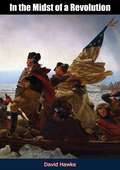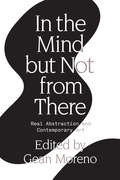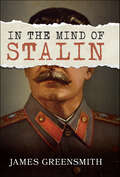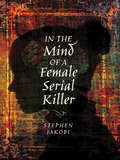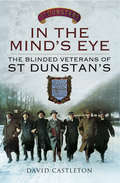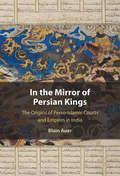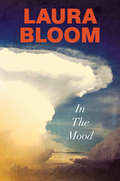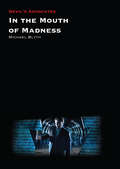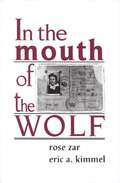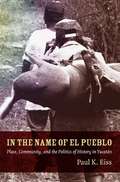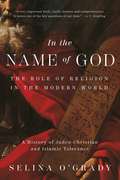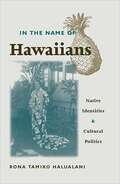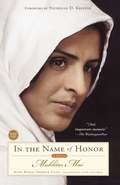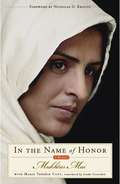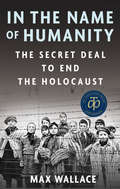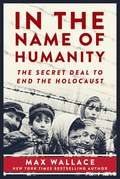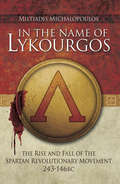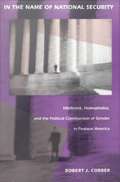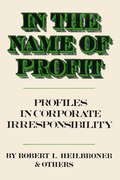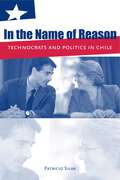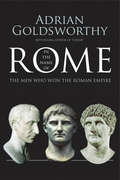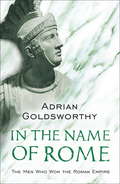- Table View
- List View
In the Midst of a Revolution
by David HawkeIn the Midst of a Revolution, originally published in 1961, provides a social history of Pennsylvania in the months before Independence, based on contemporary diaries and newspapers. The author, Dr. David Freeman Hawke, a teacher at Pace University in New York City, examines the events of Pennsylvania in 1776, which made it possible to overthrow the venerable Charter of Privileges of 1701, and to replace it with the more democratic Constitution of 1776.A useful book with informative footnotes and an extensive bibliography.
In the Mind But Not From There: Real Abstraction and Contemporary Art
by Gean MorenoArtists and critics explore the concept of Real Abstraction to help understand contemporary cultural productionIn the Mind, But Not From There: Real Abstraction and Contemporary Art considers how the Marxian concept of Real Abstraction--originally developed by Alfred Sohn Rethel, and recently updated by Alberto Toscano--might help to define the economic, social, political, and cultural complexities of our contemporary moment. In doing so, this volume brings together noted contemporary artists, literary critics, curators, historians, and social theorists who connect the concept of Real Abstraction with contemporary cultural production. Theoretical and artistic contributions from Benjamin Noys, Paul Chan, Joao Enxuto and Erica Love, Marina Vishmidt, Sven Lütticken, and many others help to map out the relationship between political economy and artistic production in the realm of contemporary, globalized cultural exchange. This anthology places economic and social analyses alongside creative projects and visual essays to consider the many angles of contemporary art, and how inquiry into the the production of abstraction through material and social processes can be used to better understand, and hopefully change, the conditions under which art is made, seen, and circulated today.Published in collaboration with [NAME] publications.
In the Mind of Stalin
by James GreensmithOn 1 October 1939, Winston Churchill, First Lord of the Admiralty and soon to be the UK’s wartime leader, described Russia as ‘a riddle wrapped in a mystery inside an enigma’. The same can certainly be said of Stalin. How can this paradox of a man, who on the one hand had once exhibited great tenderness and kindness to his daughter Svetlana, and on the other sent millions – including members of his own family - to their deaths, be explained? It is impossible to quantify the total number of deaths attributable to the policies of Stalin, but the ‘Excess Mortality’ (i.e., deaths over and above what would normally have been expected during the period in question) gives an approximate figure in excess of 40 million. However, this is only part of the story of the amount of misery inflicted by the Stalin regime through torture, deliberate starvation, neglect, separation from loved ones, cold and hypothermia (e.g. in the prisons of Siberia), which is unquantifiable and unimaginable. Svetlana confessed that she ‘would never undertake to “explain” what motivated all my father’s actions, simply because I do not possess the psychological genius of [Russian novelist] Dostoevsky, who knew how to “penetrate” into another man’s soul and “examine it from within”’.
In the Mind of a Female Serial Killer
by Stephen JakobiFour turn-of-the-century fiends whose “crimes, even by today’s standards, are still shocking—because they were committed by women” (Yorkshire Magazine). Their names may not be as familiar as such notorious female serial killers as Aileen Wuornos, Myra Hindley, Martha Beck, or Belle Gunness. But more than a century ago they made headlines and enthralled a bloodthirsty public. Now, venturing into the darkest side of human behavior, journalist Stephen Jakobi unearths the life and crimes of four of history’s most twisted women: Agnes Norman, a London servant girl whose victims of choice were children, including three infants. Most startling is that Agnes was a child herself—only fifteen-years-old. Louie Calvert, a prostitute condemned for only one murder. But her unique death cell autobiography revealed much more to her story. Kate Webster committed one of the sickest slayings of the Victorian era. Was she also responsible for the Thames Torso Murders which rivaled Jack the Ripper? Finally, the mysterious Mrs. Willis, an English “baby farmer” whose services included foster care, wet-nursing, and infanticide. Using original research based on family-owned primary sources and government files only recently made available, In the Mind of a Female Serial Killer delves into to the grisly psyche of these infamous murderesses.
In the Mind's Eye: The Blinded Veterans of St Dunstan's
by David CastletonDiscover the stories of the men and women who sacrificed their sight for their country. Since 1915 St Dunstan's (now Blind Veterans UK) has helped thousands of war-blinded men and women to rejoin society and live their lives to the full. This compelling book includes new research from the St Dunstan's archive and previously untold stories of the people, both blind and sighted, involved in the charity during the First and Second World Wars. St Dunstan's was founded by Sir Arthur Pearson, a blind press baron determined to prove that the blind could make a valuable contribution to society. Early St Dunstaners played football against Arsenal; learned to read braille, type, row and even shoot; and trained for new careers as masseurs, carpenters, switchboard operators and gardeners. As PR officer at St Dunstan's for 35 years, David Castleton worked with many of the men and women whose stories he tells in his book, and provides a unique insight into their achievements. Meet irrepressible Tommy Milligan, who lost his sight just months after enlisting on his eighteenth birthday, and Ian Fraser, blinded on the Somme, but later president of St Dunstan's. David Bell, who lost his hands and sight in a North African mine-field, yet found hope and a wife at St Dunstan's. War-blinded servicewomen also joined the charity during the Second World War, including 22-year-old Gwen Obern, blinded and maimed in a factory accident but later famed for her singing, and ATS sergeant Barbara Bell, who became a top physiotherapist.
In the Mirror of Persian Kings: The Origins of Perso-Islamic Courts and Empires in India
by Blain AuerFor a period of nearly eight hundred years, Perso-Islamic kingship was the source for the dominant social and cultural paradigms organising Indian political life. In the medieval world of South Asia, Persian kingship took the form of a hybridized and adaptive political expression. The Persian king embodied the values of justice, military heroics, and honor, ideals valorized historically and transculturally, yet the influence of the pre-Islamic Persian past and Persian forms of kingship has not yet been fully recognised. In this book, Blain Auer demonstrates how Persian kingship was a transcultural phenomenon. Describing the contributions made by kings, poets, historians, political and moral philosophers, he reveals how and why the image of the Persian king played such a prominent role in the political history of Islamicate societies, in general, and in India, in particular. By tracing the historical thread of this influence from Samanid, Ghaznavid, and Ghurid empires, Auer demonstrates how that legacy had an impact on the establishment of Delhi as a capital of Muslim rulers who made claims to a broad symbolic and ideological inheritance from the Persian kings of legend.
In the Mood
by Laura BloomRobert was surprised when he saw the atom blast on film, the mushroom cloud billowing up to the sky, so peaceful and final-looking. So natural-seeming that this was what would end it. ... ...Home was her, Catherine, in her blue cotton dress, dancing to the radio in the living room, the furniture pushed back against the walls to give her space. Him sitting on one of the chairs against the wall, entranced, not just by the glimpses of thigh and garter belt, her skirt in a perpetual flying ruffle, but her energy, her hips and hands and every part of her so alive. It's February 1946, and Robert Booker is just home from the war. Home is a pretty weatherboard house in Sydney, where his wife, Catherine, is waiting. They haven't seen each for three years, yet they are separated by so much more than time. Robert is haunted by the horrors of what he has seen and done, fighting in the humid jungles of New Guinea, and Catherine is carrying the guilt of her affair with a charismatic US Marine - and other secrets too painful to confront. Her heart divided between two men, she finds herself longing for all she has lost. With so much that's changed between them, can Catherine and Robert find their way back to each other again? Through intimately exploring the experience of one couple, and one war, Laura Bloom powerfully humanises the damage wrought by all wars to people everywhere.
In the Mouth of Madness (Devil's Advocates)
by Michael BlythSomewhat overlooked upon its initial release in 1995, John Carpenter's In the Mouth of Madness has since developed a healthy cult reputation. But far more than simply a fan favorite, this closing installment of the acclaimed director's self-described "apocalypse trilogy" (following The Thing and Prince Of Darkness) stands today as one of his most thematically complex and stylistically audacious pieces of work.The story of an insurance investigator drawn into the supposedly fictional universe of a best-selling horror novelist, the film is an extension of many recurring themes found in Carpenter's filmography (the end of the world, the loss of free will, a distrust of mass industry and global corporations, the cataclysmic resurgence of ancient evil), as well as an affectionate homage to the works of H. P. Lovecraft (and horror literature more broadly) and a self-reflexive celebration of the horror genre that predates the Scream-inspired postmodernist boom of late-'90s genre cinema. While numerous books and countless academic essays have been written about Carpenter's work, surprisingly little has focused exclusively on In the Mouth of Madness, a film which feels more prescient, more essential, and more daringly complex than ever. This book seeks to redress this imbalance, at last positioning this overlooked masterpiece as essential Carpenter.
In the Mouth of the Wolf
by Eric A. Kimmel Rose ZarRose Zar was 19 years old when the Nazis invaded her native Poland. Her father urged her to save herself by hiding "in the mouth of the wolf"--or within the enemy itself. She managed to obtain false papers, secretly changing her identity to that of a Catholic Pole and surviving the Holocaust, staying in Poland, as maid and nanny for a Nazi SS colonel.
In the Name of El Pueblo: Place, Community, and the Politics of History in Yucatán
by Paul K. EissThe term “el pueblo” is used throughout Latin America, referring alternately to small towns, to community, or to “the people” as a political entity. In this vivid anthropological and historical analysis of Mexico’s Yucatán peninsula, Paul K. Eiss explores the multiple meanings of el pueblo and the power of the concept to unite the diverse claims made in its name. Eiss focuses on working-class indigenous and mestizo populations, examining how those groups negotiated the meaning of el pueblo among themselves and in their interactions with outsiders, including landowners, activists, and government officials. Combining extensive archival and ethnographic research, he describes how residents of the region have laid claim to el pueblo in varied ways, as exemplified in communal narratives recorded in archival documents, in the performance of plays and religious processions, and in struggles over land, politics, and the built environment. Eiss demonstrates that while el pueblo is used throughout the hemisphere, the term is given meaning and power through the ways it is imagined and constructed in local contexts. Moreover, he reveals el pueblo to be a concept that is as historical as it is political. It is in the name of el pueblo-rather than class, race, or nation-that inhabitants of northwestern Yucatán stake their deepest claims not only to social or political rights, but over history itself.
In the Name of God: The Role of Religion in the Modern World: A History of Judeo-Christian and Islamic Tolerance
by Selina O'GradyA groundbreaking book on the history of religious tolerance and intolerance that offers an essential narrative to understanding Islam and the West today.Never has this book been more timely. Religious intolerance, the resurgence of fundamentalism, hate crimes, repressive laws, and mass shootings are pervasive in today&’s world. Selina O&’Grady asks how and why our societies came to be as tolerant or intolerant as they are; whether tolerance can be expected to heal today&’s festering wound between Islam and the post-Christian West; or whether something deeper than tolerance is needed. From Umar, the seventh century Islamic caliph who led what became the greatest empire the world has ever known, to King John (of Magna Carta fame) who almost converted to Islam; from Ibn Abd al-Wahhab, who created the religious-military alliance with the House of Saud that still survives today, to the bloody Thirty Years&’ War that cured Europe of murderous intra-Christian violence (but probably killed God in the process), Selina O&’Grady takes the reader through the intertwined histories of the Muslim, Christian, and Jewish faiths. In the Name of God is an original and thought-provoking history of monotheistic religions and their ever-shifting relationship with each other.
In the Name of Hawaiians: Native Identities and Cultural Politics
by Rona Tamiko HalualaniDeep within the historical imagination, there lies the image of a Western explorer surrounded by dark and strange natives. In the modern and postmodern spaces of tourism, one finds the reflections of an antiquated nativism that is already dead, however commercially viable. And in the statutes of the State of Hawaii, the Aloha Spirit is codified into the ideology of multiculturalism. Where, among the multiple representations and constructions of what is "Hawaiian," is Hawaiian identity actually lived? <p><p>Rona Tamiko Halualani analyzes the diverse formations and practices of Hawaiian identity and sociality, on the U.S. mainland as well as in the islands, across several interrelated contexts: museum culture, explorer journals, maps, tourism, census technology, blood quantum mandates, neocolonial administration, and lived community practice. Halualani shows how these contexts represent larger forces from different historical moments that significantly changed the social relations surrounding Hawaiians, the ways in which they have been identified, and how they make sense of who they are. Throughout she interweaves the countering narratives and practices by indigenous Hawaiians as they seek the authorization of their identities, land rights, and culture.
In the Name of Honor
by Linda Coverdale Marie-Therese Cuny Nicholas D. Kristof Mukhtar MaiIn June 2002, journalists throughout the world began to hear of the gang rape of a Pakistani woman from the impoverished village of Meerwala. The rape was ordered by a local clan known as the Mastoi and was arranged as punishment for indiscretions allegedly committed by the woman's brother. While certainly not the first account of a female body being negotiated for honor in a family, and (sadly) not the last, journalists and activists were captivated. This time the survivor had chosen to fight back, and in doing so, single-handedly changed the feminist movement in Pakistan. Her name was Mukhtar Mai, and her decision to stand up to her accusers was an act of bravery unheard of in one of the world's most adverse climates for women. By July 2002, Mai's case was headline news in Pakistan and under international scrutiny, the government awarded her the equivalent of 8,500 U.S. dollars in compensation money (a historic settlement), and her attackers were sentenced to death. Mukhtar Mai went on to open a school for girls in an effort to ensure that future generations would not suffer, as she had, from illiteracy. In this rousing account, Mai describes her experience and how she has since become an agent for change and a beacon of hope for oppressed women around the world. Timely and topical, In the Name of Honor is the remarkable and inspirational memoir of a woman who fought and triumphed against exceptional odds.
In the Name of Honor: A Memoir
by Linda Coverdale Marie-Therese Cuny Nicholas D. Kristof Mukhtar MaiIn June 2002, journalists throughout the world began to hear of the gang rape of a Pakistani woman from the impoverished village of Meerwala. The rape was ordered by a local clan known as the Mastoi and was arranged as punishment for indiscretions allegedly committed by the woman's brother. While certainly not the first account of a female body being negotiated for honor in a family, and (sadly) not the last, journalists and activists were captivated. This time the survivor had chosen to fight back, and in doing so, single-handedly changed the feminist movement in Pakistan. Her name was Mukhtar Mai, and her decision to stand up to her accusers was an act of bravery unheard of in one of the world's most adverse climates for women. By July 2002, Mai's case was headline news in Pakistan and under international scrutiny, the government awarded her the equivalent of 8,500 U.S. dollars in compensation money (a historic settlement), and her attackers were sentenced to death. Mukhtar Mai went on to open a school for girls in an effort to ensure that future generations would not suffer, as she had, from illiteracy. In this rousing account, Mai describes her experience and how she has since become an agent for change and a beacon of hope for oppressed women around the world. Timely and topical,In the Name of Honor is the remarkable and inspirational memoir of a woman who fought and triumphed against exceptional odds.
In the Name of Humanity
by Max WallaceThe untold true story of the secret negotiations--by the most unlikely figures--to end the Holocaust On November 25, 1944, prisoners at Auschwitz heard a deafening explosion. Emerging from their barracks, they witnessed the crematoria and gas chambers--part of the largest killing machine in human history--come crashing down. Most assumed they had fallen victim to inmate sabotage and thousands silently cheered. However, the Final Solution's most efficient murder apparatus had not been felled by Jews, but rather by the ruthless architect of mass genocide, Reichsführer-SS Heinrich Himmler. It was an edict that has puzzled historians for more than six decades. Holocaust historian and New York Times bestselling author Max Wallace--a veteran interviewer for Steven Spielberg's Shoah Foundation--draws on an explosive cache of recently declassified documents and an account from the only living eyewitness to unravel the mystery. He uncovers an astounding story involving the secret negotations of an unlikely trio--a former fascist President of Switzerland, a courageous Orthodox Jewish woman, and Himmler's Finnish osteopath--to end the Holocaust, aided by clandestine Swedish and American intelligence efforts. He documents their efforts to deceive Himmler, who, as Germany's defeat loomed, sought to enter an alliance with the West against the Soviet Union. By exploiting that fantasy and persuading Himmler to betray Hitler's orders, the group helped to prevent the liquidation of tens of thousands of Jews during the last months of the Second World War, and thwarted Hitler's plan to take "every last Jew" down with the Reich. Deeply researched and dramatically recounted, In the Name of Humanity is a remarkable tale of bravery and audacious tactics that will help rewrite the history of the Holocaust.
In the Name of Humanity: The Secret Deal to End the Holocaust
by Max WallaceShortlisted for the 2018 RBC Taylor prize for literary nonfiction“A riveting tale of the previously unknown and fascinating story of the unsung angels who strove to foil the Final Solution.”—Kirkus starred reviewOn November 25, 1944, prisoners at Auschwitz heard a deafening explosion. Emerging from their barracks, they witnessed the crematoria and gas chambers--part of the largest killing machine in human history--come crashing down. Most assumed they had fallen victim to inmate sabotage and thousands silently cheered. However, the Final Solution's most efficient murder apparatus had not been felled by Jews, but rather by the ruthless architect of mass genocide, Reichsführer-SS Heinrich Himmler. It was an edict that has puzzled historians for more than six decades. Holocaust historian and New York Times bestselling author Max Wallace--a veteran interviewer for Steven Spielberg's Shoah Foundation--draws on an explosive cache of recently declassified documents and an account from the only living eyewitness to unravel the mystery. He uncovers an astounding story involving the secret negotiations of an unlikely trio--a former fascist President of Switzerland, a courageous Orthodox Jewish woman, and Himmler's Finnish osteopath--to end the Holocaust, aided by clandestine Swedish and American intelligence efforts. He documents their efforts to deceive Himmler, who, as Germany's defeat loomed, sought to enter an alliance with the West against the Soviet Union. By exploiting that fantasy and persuading Himmler to betray Hitler's orders, the group helped to prevent the liquidation of tens of thousands of Jews during the last months of the Second World War, and thwarted Hitler's plan to take "every last Jew" down with the Reich. Deeply researched and dramatically recounted, In the Name of Humanity is a remarkable tale of bravery and audacious tactics that will help rewrite the history of the Holocaust.
In the Name of Lykourgos: The Rise and Fall of the Spartan Revolutionary Movement (243–146 BC)
by Miltiadis MichalopoulosIn the middle of the 3rd century B.C. Sparta was a shadow of its glorious past. Politically and militarily weakened and with huge inner social problems, she seemed to have followed the fate of most contemporary city- states and fallen on the fringe of the political developments of her time. The 3rd century was a time when the great states and the Hellenistic empires were prominent. But contrary to the other city states, which compromised with the new political forces of their time, Sparta resisted stubbornly and tried to reclaim the hegemony of southern Greece. In this fight, Sparta showed unexpected vigor, even defying one of the most formidable powers of the time: Macedonia. The uneven collision that followed culminated tragically and painfully for Sparta at the Battle of Sellasia in 222BC. And still Sparta refused to compromise. After a while, she managed to recover and became once more a player on the international stage, not hesitating this time to challenge the most powerful state of the ancient world: Rome. This last Spartan twilight, the revolutionary movement that sparked it and the two ultimate turning points of her history [the battle of Sellasia and the siege of Sparta by the Romans] are analysed in this book with exhaustive bibliography and special emphasis on the military aspects of this epic fight. The original Greek edition of In the Name of Lykourgos received great critical acclaim and was named winner of the 2009 Lakedaimonian Prize of the Academy of Athens. It is here translated into English for the first time.
In the Name of Magic
by Chris BedellNonmagical people are being demonized and falsely blamed for Magnifico’s economic problems after Queen Vivian’s bloody rise to power. But politics very quickly become more than abstract views to argue about when secret police wolves are deployed throughout the country to kill those born without magical abilities.Seventeen-year-old Maximillian’s best friend Katherine is one such nonmagical person. In a bid to keep her safe, Maximillian turns to the queen’s estranged younger brother, a man thought to be dead until recently.Prince Stefan is nineteen years old and has been in hiding from his family for years. He has no desire to resurface in the political world. Can Maximillian convince him the country needs him before it’s too late?
In the Name of National Security: Hitchcock, Homophobia, and the Political Construction of Gender in Postwar America
by Robert J. CorberIn the Name of National Security exposes the ways in which the films of Alfred Hitchcock, in conjunction with liberal intellectuals and political figures of the 1950s, fostered homophobia so as to politicize issues of gender in the United States. As Corber shows, throughout the 1950s a cast of mind known as the Cold War consensus prevailed in the United States. Promoted by Cold War liberals--that is, liberals who wanted to perserve the legacies of the New Deal but also wished to separate liberalism from a Communist-dominated cultural politics--this consensus was grounded in the perceived threat that Communists, lesbians, and homosexuals posed to national security. Through an analysis of the films of Alfred Hitchcock, combined with new research on the historical context in which these films were produced, Corber shows how Cold War liberals tried to contain the increasing heterogeneity of American society by linking questions of gender and sexual identity directly to issues of national security, a strategic move that the films of Hitchcock both legitimated and at times undermined. Drawing on psychoanalytic and Marxist theory, Corber looks at such films as Rear Window, Strangers on a Train, and Psycho to show how Hitchcock manipulated viewers' attachments and identifications to foster and reinforce the relationship between homophobia and national security issues. A revisionary account of Hitchcock's major works, In the Name of National Security is also of great interest for what it reveals about the construction of political "reality" in American history.
In the Name of Osama Bin Laden Global Terrorism and the Bin Laden Brotherhood
by Roland JacquardOne view of the Bin Laden Brotherhood.
In the Name of Profit
by Robert L. HeilbronerSaid One Executive: "Why should my conscience bother me?"Here are dramatic true stories of executives whose desire for profit leads them into shameful decisions. Naming actual executive of major American companies, the authors portray corporate irresponsibility in human term. One executive is shown as he orders his subordinates to fake a lab report, even though the result might be loss of life. Others are shown as they bribe a city official, as they knowingly sell a dangerous drug, as they enrich themselves by betraying their stockholders. These men are not the familiar fast-buck artists, the petty cheats who can be dismissed as "bad apples." The authors reveal themselves as solid citizens, educated and well-respected. Yet in the course of business they easily yield to ambition, avarice or the corporate culture. And almost always, after they are exposed, they are promoted by their companies.Together these profiles, all of them written especially for this book, give life to questions raised by books such as America, Inc. and The Greening of America:· What kind of men run some super-corporations?· How can "good men" behave so badly"· Does working for a corporation mean violating one's conscience? After all the stories are told, the brilliant economist and social critic Robert L. Heilbroner offers a chapter of perspective. First he confronts the various positions on corporate responsibility--at one extreme, breaking up the big corporations; at the other, leaving executive entirely free to maximize profits. And then he cuts through to the realities if the matter, showing us where the best chance of remedy lies.
In the Name of Reason: Technocrats and Politics in Chile
by Patricio SilvaThe major role played by a technocratic elite in Chilean politics was perhaps most controversial when the “Chicago Boys” ran the economic program of Augusto Pinochet’s military regime from 1973 to 1990. But technocrats did not suddenly come upon the scene when Pinochet engineered the coup against Salvador Allende’s government. They had long been important contributors to Chile’s approach to the challenges of economic development. In this book, political scientist and historian Patricio Silva examines their part in the story of twentieth-century Chile. Even before industrialization had begun in Chile, the impact of positivism and the idea of “scientific government” gained favor with Chilean intellectuals in the late nineteenth century. The technocrats who emerged from this background became the main architects designing the industrial policies of the state through the Ibáñez government (1927–31), the state-led industrialization project of the late 1930s and 1940s, the Frei and Allende administrations, Pinochet’s dictatorship, and the return to democracy from the Aylwin administration to the present. Thus, contrary to the popular belief inspired by the dominance of the Chicago Boys, technocrats have not only been the tools of authoritarian leaders but have also been important players in sustaining democratic rule. As Silva shows, technocratic ideology in Chile has been quite compatible with the interests and demands of the large middle classes, who have always defended meritocratic values and educational achievements above the privileges provided by social backgrounds. And for most of the twentieth century, technocrats have provided a kind of buffer zone between contending political forces, thereby facilitating the functioning of Chilean democracy in the past and the present.
In the Name of Rome
by Adrian GoldsworthyA definitive history of the great commanders of ancient Rome, from bestselling author Adrian Goldsworthy. "In his elegantly accessible style, Goldsworthy offers gripping and swiftly erudite accounts of Roman wars and the great captains who fought them. His heroes are never flavorless and generic, but magnificently Roman. And it is especially Goldsworthy's vision of commanders deftly surfing the giant, irresistible waves of Roman military tradition, while navigating the floating logs, reefs, and treacherous sandbanks of Roman civilian politics, that makes the book indispensable not only to those interested in Rome and her battles, but to anyone who finds it astounding that military men, at once driven and imperiled by the odd and idiosyncratic ways of their societies, can accomplish great deeds." --J. E. Lendon, author of Soldiers and Ghosts: A History of Battle in Classical Antiquity
In the Name of Rome: The Men Who Won the Roman Empire
by Adrian GoldsworthyThe complete and definitive history of how Roman generals carved out the greatest and longest-lasting empire the world has ever seen.The Roman army was one of the most effective fighting forces in history. The legions and their commanders carved out an empire which eventually included the greater part of the known world. This was thanks largely to the generals who led the Roman army to victory after victory, and whose strategic and tactical decisions shaped the course of several centuries of warfare.This book, by the author of THE PUNIC WARS, concentrates on those Roman generals who displayed exceptional gifts of leadership and who won the greatest victories. With 26 chapters covering the entire span of the Roman Empire, it is a complete history of Roman warfare.
In the Name of Rome: The Men Who Won the Roman Empire
by Adrian GoldsworthyThe complete and definitive history of how Roman generals carved out the greatest and longest-lasting empire the world has ever seen.The Roman army was one of the most effective fighting forces in history. The legions and their commanders carved out an empire which eventually included the greater part of the known world. This was thanks largely to the generals who led the Roman army to victory after victory, and whose strategic and tactical decisions shaped the course of several centuries of warfare.This book, by the author of THE PUNIC WARS, concentrates on those Roman generals who displayed exceptional gifts of leadership and who won the greatest victories. With 26 chapters covering the entire span of the Roman Empire, it is a complete history of Roman warfare.
